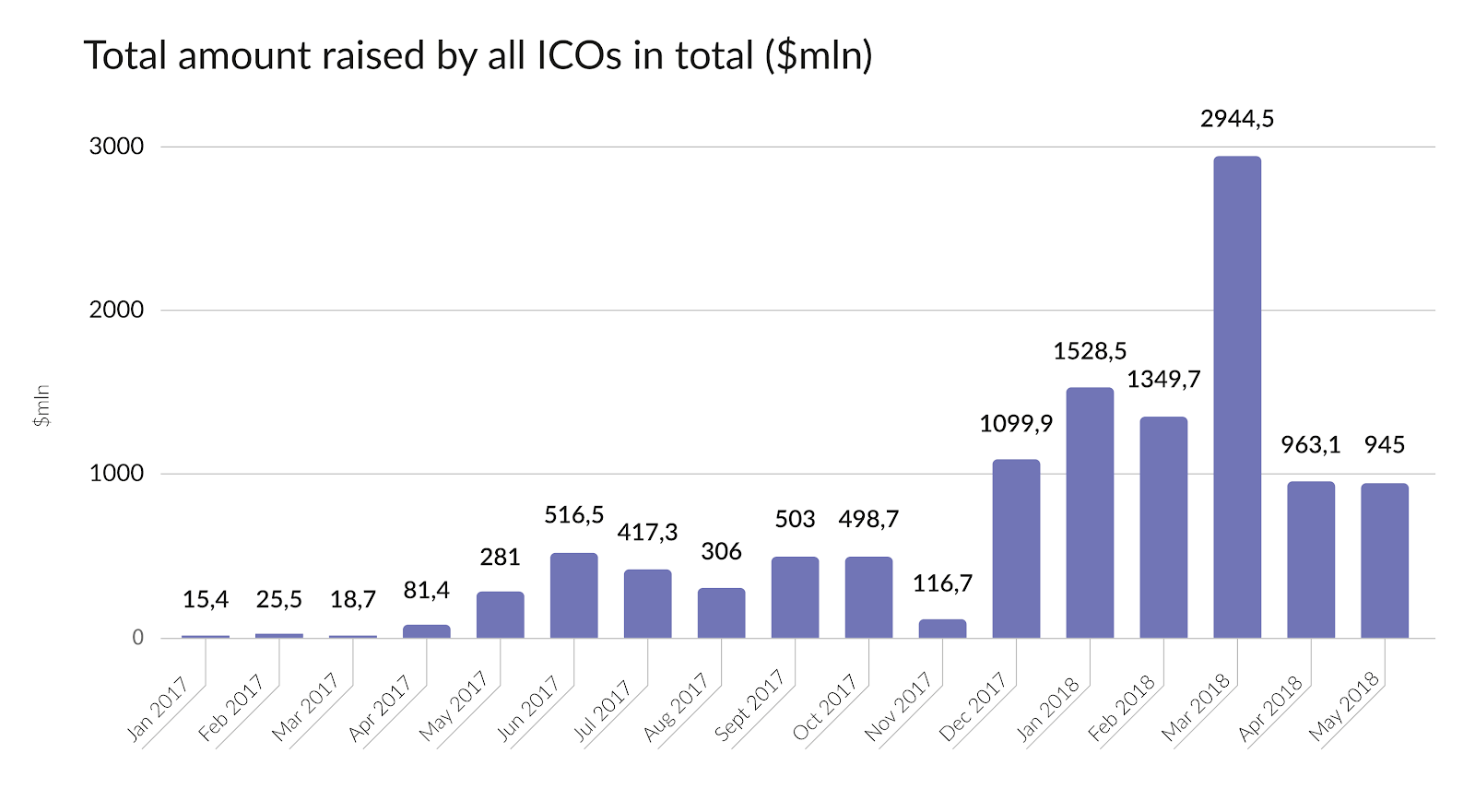This article highlights what you should know about the inevitable crackdown on ICOs, and how understanding SEC regulations on ICOs is vital.

Since 2016, investments in initial coin offerings (ICOs) have grown steadily. 2018 saw a rise in ICO offerings to a tune of over $9+ billion USD. Companies from around the globe are increasingly turning to digital currencies as a means of raising funds. In response, regulatory bodies – like the Securities and Exchange Commission (SEC) – are working diligently to place reasonable controls on ICOs.

(Source: Cointelegraph)
Predominately, the SEC aims to regulate ICOs as a means of combating fraud, preventing market manipulation, and protecting investors. The cryptocurrency market has seen its fair share of shady business practices and scams over the past couple of years, so this may be a reassuring move.
Understanding how the SEC views ICOs and the various application of regulations can help you select potential investments and navigate a fairly tricky market.
(See more: Crypto ICO vs. Stock IPO: What’s the Difference?)
Understanding The Role of the SEC

In order to be on the safe side, understanding the core functionality of the regulatory body is critical. The United States Congress created the Securities and Exchange Commission (SEC) in 1934, functioning as a response to the stock market crash of 1929. The goal was to prevent companies from sharing misleading or false information with investors, such as skewing reports about their performance or future prospects. With that, the SEC was tasked with regulating the securities market.
Predominately, the main role of the SEC entails verifying statements from companies and keeping institutions – such as exchanges and brokers or dealers – fair and honest. This is seemingly a much needed practice in the unregulated ‘wild west’ of the cryptocurrency world.
While this does not come with it’s own downside, what is important to understand is what the SEC is looking for. It starts with the Howey Test.
(Read also: Bitcoin vs Alt Coins Returns: Comparison of Gains Between Bitcoin & Altcoins Investing)
SEC Regulations: Understanding The Howey Test
Whether a coin or a token is deemed a security plays a big role in determining which, if any, regulations apply. While the treatment of utility tokens still needs clarity, security tokens relate directly to a company’s growth, making them effectively similar to stocks. Security tokens fall within the SEC’s purview, giving them the ability to regulate the ICO.

The SEC uses the Howey Test – a set of conditions that identify “investment contracts” – to decide whether an ICO is a security token. The four conditions you should be aware of include:
- Money is invested
- Those who invest money expect a profit
- The monetary investment was in a common enterprise
- Profits come from the efforts of a third-party or promoter
If those four conditions apply, the SEC considers the token a security, making it subject to various regulations.
At this time, it seems that a majority of cryptocurrencies qualify as securities. Simply wishing or stating that a token doesn’t fall into the above doesn’t make it true. It must be proven based on the actual investment procedure and function of the token.
Understanding this critical step will help you navigate which existing tokens may have regulatory challenges in the future, and which ICOs may be in the SEC’s crosshairs.
(See also: Evolution of Cryptocurrency: Replacing Modern Cash)
SEC Regulations on ICOs
When a token is deemed a security, it is subject to the same regulations as other securities. Compliance can be daunting, and many ICOs fall short.
The SEC places the same demands on ICOs as it does on stocks and bonds. There are no separate regulations for ICOs that qualify as securities according to the Howey Test. Additionally, they also apply securities laws to cryptocurrency exchanges, and even digital wallets.
One of the core rules is the requirement to register with the SEC unless conditions for being exempt are met. Once registered, the disclosure of certain business and financial information is required. This ensures that potential investors are well-informed and helps limit the spread of deceitful information.
The company must provide the SEC with a description of their purpose and properties. Additionally, they have to describe the security (in this case, the coin) and submit financial statements that are certified by independent accountants. Details about the company’s management are also necessary.
The primary purpose is to prevent fraud and give investors the ability to make decisions based on accurate data. Naturally the SEC will go after the most obvious violators first. Bitconnect and others like it will be the key targets to start. But do not be surprised if the SEC starts to apply the rules to more of the grey zone tokens – potentially putting your investments at risk.
(Read more: Is it Too Late to Buy Bitcoin and Is It too Late to Invest in Cryptocurrency?)
The Move Towards Security Tokens & Utility Tokens
Naturally, not all cryptocurrencies qualify as securities. For instance, Bitcoin and Ethereum are not considered securities and have thankfully avoided SEC's regulations since they are considered more of commodities rather than securities. Likewise, utility tokens are not subjected to the same kinds of regulations as securities since they are not viewed as investments. And while the value of the token may increase, leading to a potential profit – they instead align closer to actual hard currencies, such as the US dollar or the Euro.
For those that are akin to securities you’ll notice a shift towards Securitized Tokens.
Security tokens are coins that are considered securities but do aim to follow the SEC regulations. These are unfortunately, only available to accredited investors.
Staying in the green requires a keen eye on the type’s of tokens one is purchasing. Understanding the underlying drive of the SEC, the difference between coins and tokens that may or may not be securities, utility tokens and securitized tokens is critical to navigating the landscape.
And even after all is said and done – this does not negate the fact that other countries have their own securitized rules and regulations regarding investments. It means that while the above can help you, you’ll additionally want to do your own research on the country you reside in.
(You might also be interested in: Guide to Cryptocurrency Taxes: A Guide to Common Tax Situations)
—–
This article was contributed by Cahill Puil, a blockchain expert and the managing director of Byte Media Group.
Beneficial Resources To Get You Started
If you're starting your journey into the complex world of cryptocurrencies, here's a list of useful resources and guides that will get you on your way:

Trading & Exchange
- Crypto Guide 101: Choosing The Best Cryptocurrency Exchange
- Guide to Bittrex Exchange: How to Trade on Bittrex
- Guide to Binance Exchange: How to Open Binance Account and What You Should Know
- Guide to Etherdelta Exchange: How to Trade on Etherdelta
- Guide To Cryptocurrency Trading Basics: Introduction to Crypto Technical Analysis
- Cryptocurrency Trading: Understanding Cryptocurrency Trading Pairs & How it Works
- Crypto Trading Guide: 4 Common Pitfalls Every Crypto Trader Will Experience
Wallets
- Guide to Cryptocurrency Wallets: Why Do You Need Wallets?
- Guide to Cryptocurrency Wallets: Opening a Bitcoin Wallet
- Guide to Cryptocurrency Wallets: Opening a MyEtherWallet (MEW)
Read also: Crypto Trading Guide: 4 Common Pitfalls Every Crypto Trader Will Experience and Guide To Cryptocurrency Trading Basics: Introduction to Crypto Technical Analysis.
Get our exclusive e-book which will guide you on the step-by-step process to get started with making money via Cryptocurrency investments!
You can also join our Facebook group at Master The Crypto: Advanced Cryptocurrency Knowledge to ask any questions regarding cryptocurrencies.

